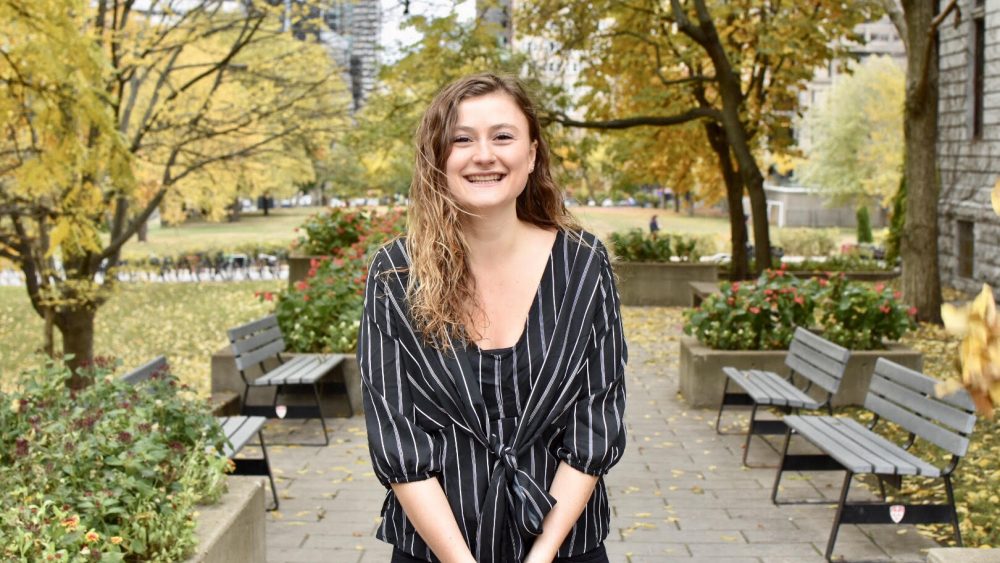Naomi Santesteban is a 1L JD Candidate at Osgoode Hall Law School and is serving as Co-Director of Communications at Osgoode Hall’s IRAP Chapter during the 2020-2021 academic year.
This past Saturday, I attended IRAP’s Virtual Student Summit along with over 50 representatives from law school chapters across North America. I am currently serving as the Co-director of Communications for Osgoode Hall’s IRAP Chapter, located in Toronto, Ontario. As a 1L, this was one of the first events I participated in since embarking on my legal education. I left the Summit feeling extremely inspired and grateful to be a part of such a large network of law students with a commitment to refugee advocacy and legal assistance. Even though we were not able to physically gather together for this year’s Summit, I still felt more connected than ever to all my fellow IRAP chapter members.
The event began with two plenary presentations. The first was an introduction by IRAP’s Executive Director, Becca Heller. The second was a presentation on Community Lawyering by IRAP’s Deputy Executive Director, Nisha Agarwal. Becca’s introduction served as an important reminder of the significance of the work we do and why we do it. One particular portion of her introduction resonated personally with me: when she spoke about the importance of committing to our role as legal refugee advocates. This is to ensure that the services and resources that we offer to clients continue to be meaningful and impactful. Vulnerable populations, including refugees and displaced people, are often in need of many social services and essential resources. However, we must be wary of not spreading ourselves too thin such that we are no longer able to advocate for or provide adequate legal assistance to our clients. In practical terms, this may mean referring clients to partner organizations rather than attempting to take on additional responsibilities or obligations ourselves.
As someone who had never been exposed to the notion of ‘community lawyering’ prior to the Summit, Nisha’s presentation was also especially eye-opening for me. It introduced an approach to lawyering that seems to be most effective in social justice contexts. Nisha discussed the significance of empowering the narrative of refugees and immigrants themselves to ensure it is not reduced to one of vulnerability. Rather, we ought to broaden the narrative to one of strength and resilience. I also appreciated how Nisha presented community lawyering as an approach that is accessible and simple to apply within the legal world.
Our Chapter Director, Nika Arbabzadeh Broujeni, was also in attendance at the Summit and felt inspired. She said that “being able to listen and contribute to a group of people who share the same purpose and values feels empowering. Especially during times like this when it seems like we have no control over the affairs of the world, being in the company of people who are still working towards the betterment of the world can be very motivating. I am looking forward to collaborating with other student chapters on different initiatives.” I couldn’t agree more with Nika.
So what’s next for our chapter at Osgoode?
We have a lot of exciting plans for events coming up this semester that we hope will engage our community of general members. Later this semester, we teamed up with our student society at Osgoode, Legal&Lit, to host a virtual book club discussion. Together, we will be reading and discussing The Ungrateful Refugee by Dina Nayeri. This will be a fun opportunity to destress, relax, and engage in some thoughtful discussions with our peers.
We have also begun planning the IRAP Lunch & Learn series that will take place over the course of the year. This virtual series aims to increase the Osgoode student body’s awareness of dimensions of refugee law by arranging various speakers to lead sessions or workshops over Zoom on critical issues related to migration. We are very excited for this project as it is a great way to engage in remote refugee and migration advocacy in these unprecedented times.
In addition to these upcoming opportunities for engagement, IRAP Osgoode will be supporting pro bono case teams on a handful of United Nations High Commissioner for Refugees (UNHCR) cases, and collaborating with IRAP McGill on a project researching family reunification pathways in Canada as part of IRAP’s Complementary Pathways work.
As future lawyers, I believe we have an important stake in fighting for the rights of refugees and forcibly displaced people. In the era of COVID-19, I also understand how it can be very easy to be preoccupied with personal matters or all the other events happening around the world. The result is that refugee and migration issues are forgotten, or placed aside. My hope is that our advocacy efforts at IRAP Osgoode will allow students to engage with these issues in a feasible and accessible manner. If students are able to leave events understanding why these issues are important and necessitate attention, I consider that a success.
For more student impressions from the 2020 Summit, visit our Instagram highlight from the event.






Comments are closed.